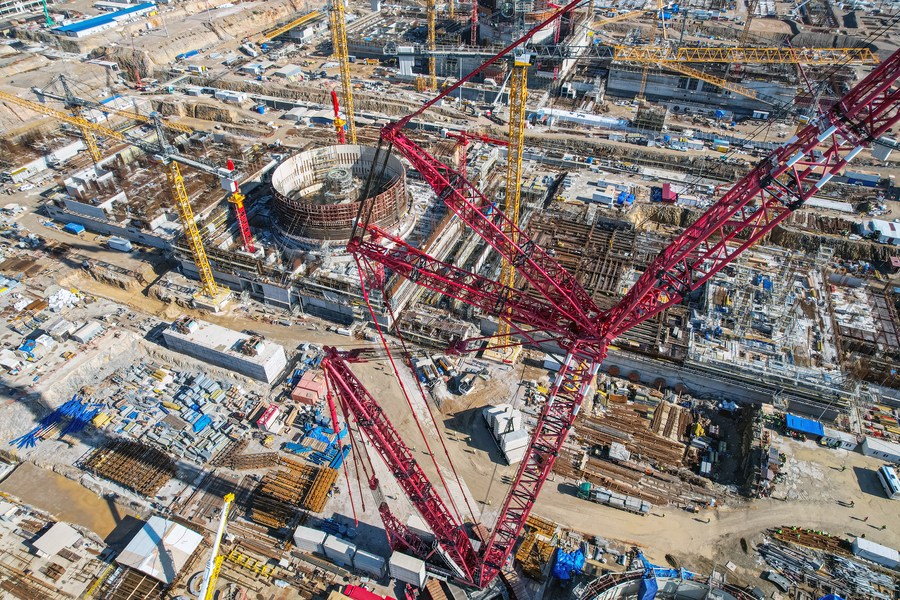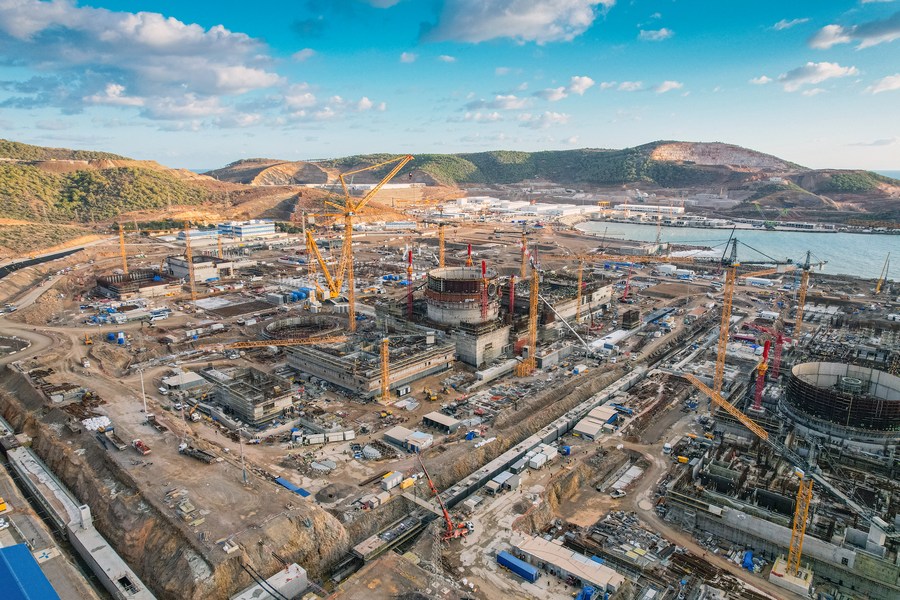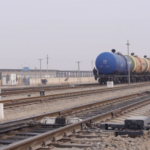ANKARA, April 2 (Xinhua) — Türkiye is set to inaugurate the first unit of its Russian-built nuclear power plant in late April by loading nuclear fuel, a step towards boosting national energy security and strengthening energy ties with Moscow, experts said.
The Akkuyu Nuclear Power Plant, currently under construction in Türkiye’s southern Mersin Province, will be the country’s first nuclear power plant. Akkuyu will be operational for 60 years, plus a possible 20-year extension, until its decommissioning.
During an interview with private broadcaster ATV on Wednesday, Turkish President Recep Tayyip Erdogan said that the fuel-loading ceremony will be held on April 27 in Akkuyu.
Power production at the plant is set to begin later this year, likely in late October, public broadcaster TRT reported last month, citing energy ministry officials.
Erdogan also said on Wednesday that his Russian counterpart Vladimir Putin might either travel to Mersin in person or attend the ceremony via teleconference.
In 2010, the two countries reached a deal to let Russia’s state company Rosatom build and operate the Akkuyu plant, which is designed with four nuclear reactor units, each with a capacity to generate 1,200 MW of electricity.
Under the deal, the Akkuyu plant was to be constructed with a Russian capital of 20 billion U.S. dollars.
The construction began in 2018 and is scheduled to complete in 2026. Once fully operational, the plant is expected to produce annually 35 billion kWh of electricity to meet approximately 10 percent of domestic electricity needs, Erdogan said in March 2021 at the groundbreaking ceremony of the plant’s third unit.
Türkiye aims to take steps for a second and third nuclear plant “as soon as possible”, Erdogan also said in September that year.
“Türkiye’s electricity energy needs are growing and will continue to increase considerably in the coming years,” Murat LeCompte, an Istanbul-based energy expert, told Xinhua in a recent interview.
He said that nuclear energy is effective because the amount of energy it provides is incomparable with other traditional sources.

Photo taken on Aug. 18, 2022 shows the Akkuyu nuclear power plant constructed by Russia’s state nuclear energy corporation Rosatom in the southern Turkish province of Mersin. (Xinhua)
According to the lastest data from the Energy and Natural Resources Ministry, coal has a 34.6-percent share in Türkiye’s electricity generation, followed by natural gas, 22.2 percent, and hydropower, 20.6 percent.
“Most of Türkiye’s energy sources are imported, with a heavy cost on the country’s finances, therefore a nuclear plant operating on its soil will contribute to the nation’s energy security,” said LeCompte.
Türkiye is heavily dependent on imports to meet its energy needs, with Russia being a large source for years.
Russia’s share in Türkiye’s natural gas imports was 33 percent in 2019 and 2020, declining from more than 60 percent in 2005, according to data released by the energy ministry in February.
The Akkuyu plant has deep political significance for Türkiye aside from its aspiration toward energy independence, as the project symbolizes the growing relationship between NATO member Türkiye and Russia.
“The fact that a huge and very strategic project with 100 percent Russian capital is built in a NATO country is extremely symbolic in reflecting the diversifying and deepening dimension of Turkish-Russian relations,” Kerim Has, a Moscow-based analyst on Russian affairs, told Xinhua.
The inauguration of Akkuyu comes at a time when NATO and European Union countries have imposed sanctions on Russia for launching its special military operation in Ukraine in February 2022.
Ankara has refused to sanction Russia, with which it has strengthened cooperation in some sectors over the past few years despite Western criticism.
“When the Western bloc is imposing sanctions on Russia, the construction of Akkuyu is not disrupted. It demonstrates Ankara and Moscow’s willingness to maintain their ties despite differences on the Ukraine conflict,” Has said.
According to the analyst, Akkuyu can also serve as a project to help prevent ups and downs of Türkiye-Russia relations in the long run, especially in a global world order currently characterized by major transformations.
The nuclear plant is also important for Erdogan politically, as he is running as a presidential candidate for the May 14 general elections, while the country is struggling with economic woes and the huge recovery costs of the Feb. 6 earthquakes, according to analysts. ■













